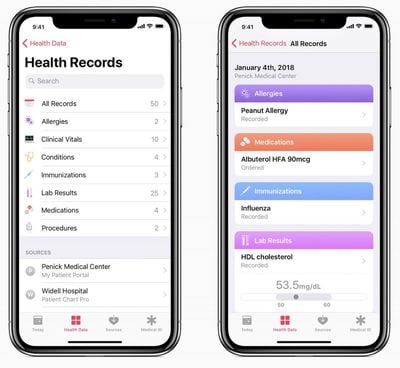Apple's Health Records feature, introduced in iOS 11.3, now allows iOS users to access their medical records from more than 75 different hospitals and medical providers in the United States.
Apple maintains a list of all of the healthcare institutions that support Health Records on the iPhone, which as VentureBeat points out, was updated in August ahead of a talk from Apple's Clinical and Health Informatics lead Ricky Bloomfield, M.D. given at the ONC 2nd Interoperability Forum (via EHR Intelligence).

When the Health Records feature first launched earlier this year, it worked with just 12 healthcare providers, a number that Apple has been working to improve. Recent additions include Kaiser in Oregon and Washington, Baptist Health, Buffalo Health, Greater Hudson Valley Health System, UC San Diego Health, UCLA Health, and others.
Health record data is available in the Health app, and allows patients who have multiple healthcare providers to access all of their information in one convenient place.
According to Bloomfield, Apple's Health app leverages Fast Healthcare Interoperability Resources (FHIR) that were developed to facilitate better data sharing standards. FHIR is in a draft stage and won't be finalized until the end of the year, but Apple's adoption may drive widespread adoption of FHIR in the medical community.
Apple is using an "Argonaut" implementation of the Fast Healthcare Interoperability Resources standard, in fact, because it's simple and will encourage medical providers to adopt it.
The Health Records feature in the Health app is designed to connect with partner systems using FHIR to collect data and display it right on a user's device.
"It makes it very easy for you to manage your health information," Bloomfield told attendees of the ONC 2nd Interoperability Forum on August 8. "You as a user have complete control over who has access to the data. If you don't want to share it, it won't be shared. It stays private on your device until you decide to share it."
As Bloomfield explains, Health Records can be accessed in the Health app under the "Health Data" section. After choosing and authenticating with a provider, all relevant medical data is available through the Health app and is updated automatically following doctor visits.
"That significantly reduces the friction typically associated with accessing your health information where you need to remember your credentials, log in, and then get the information," he continued. "And when you have new information, you may get an email that there's new information, but you still need to log in to access the information."
Health Records is designed to display information that includes allergies, vital signs, conditions, immunizations, medications, labs, and procedures.
As with all Apple features, privacy is a key with Health Records. As Bloomfield says, patients have control over who is able to access their data.





















